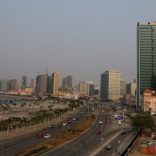Senior officers arrested in Guinea-Bissau for alleged coup attempt
Angola: USAID to support environmental issues in Lobito Corridor with $3.5M

Image: Voz de Angola
The United States Agency for International Development (USAID) in Angola on Wednesday announced an investment of US$3.5 million to support the environmental issues of local organisations in the Lobito Corridor, in the Angolan province of Benguela.
The announcement of the investment, which is equivalent to €3.13 million, was made by the USAID representative, William Butterfield, at the opening of the Lobito Corridor Coordination Conference, a railway infrastructure on the southern coast of Angola, which links the country to the mineral zones of the Democratic Republic of Congo (DRCongo) and Zambia, an event organised by the United States.
William Butterfield emphasised the fundamental role of this infrastructure in regional integration, linking the African continent, expanding export opportunities and boosting trade. This argument is in line with the US justification for the visit to Angola by US President Joe Biden from 13 to 15 October, which will serve to strengthen economic partnerships and mark the creation of the first open access transcontinental rail network in Africa.
The visit to Angola will also see the formalisation of the ‘Partnership for Global Infrastructure and Investment (PGI)’ project of the G7 (group of the seven most developed countries) for the Lobito Corridor.
“We recognise that building infrastructure can generate environmental concerns. That’s why we will invest US$3.5 million to support local organisations in Angola, ensuring that the processes are fair and accountable,” William Butterfield said today, stressing that “USAID will also help improve the government’s auditing capabilities, minimising fraud and abuse”.
According to the USAID representative in Angola, the Lobito Corridor will create many job opportunities, strengthen local economies and improve the quality of life of the communities along its route.
“The new Lobito Atlantic Railway is one of the most important transport infrastructure projects the United States has supported in Africa in a generation. It will strengthen regional trade and growth and advance our shared vision of creating an interconnected railway network from the Atlantic Ocean to the Indian Ocean,” he said.
The official stressed that one of the objectives of the Lobito Corridor is to relieve congestion on southern routes, such as Durban, South Africa, and Beira, Mozambique, by offering another transport alternative.
For the USAID representative in Angola, prioritising rail transport will reduce Africa’s carbon footprint, pointing out that recently the United States Development Finance Corporation approved up to US$533 million [€476.5 million] for the Lobito Corridor and the US Export-Import Bank “granted a historic loan of US$1.6 billion [€1.4 billion] to support 65 solar energy mini-grids in four provinces of Angola”.
For his part, the deputy director of Power Africa, Ted Lawrence, said that this initiative led by the US government and coordinated by USAID, has already helped to mobilise more than US$25 billion [€22.3 billion] for electrification projects across sub-Saharan Africa, much of it from the private sector.
According to Ted Lawrence, the Lobito Corridor offers an opportunity to tackle the energy deficit that has long hindered growth in sub-Saharan Africa, highlighting Power Africa’s vast experience in working with governments to strengthen energy policies, ‘creating the right regulatory environments to attract investment’, while also ensuring environmental preservation.













Leave a Reply
Be the First to Comment!
You must be logged in to post a comment.
You must be logged in to post a comment.